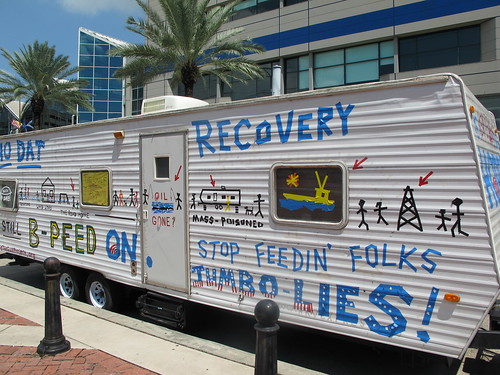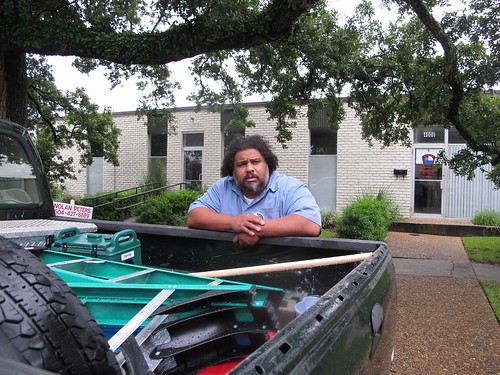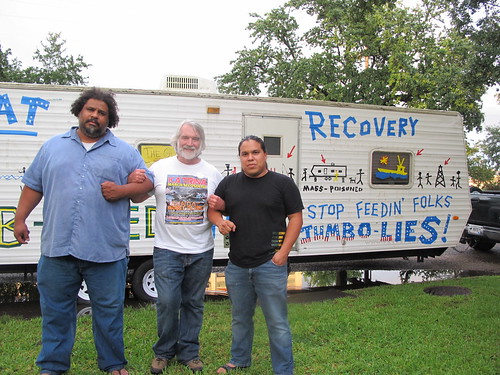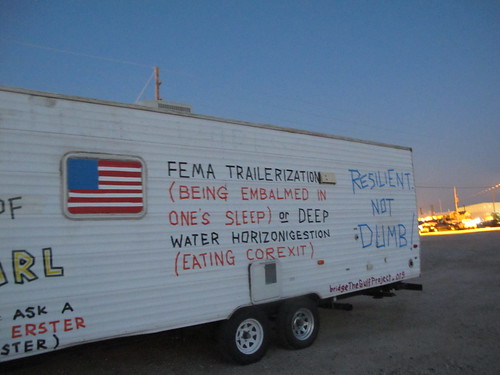Another Gulf oil explosion, a fiery reminder of what lies ahead
By Rocky Kistner. Crossposted from NRDC's Switchboard.
On the way to a meeting held by BP claims czar Ken Feinberg in Slidell yesterday, Derrick Evans wheeled his diesel pickup truck and FEMA trailer to a Mississippi River ferry crossing south of New Orleans. Derrick is probably the world’s most experienced hand at dragging FEMA trailers. Over the past few years, he hauled 30 ft aluminum sided Katrina icons more than 30,000 miles across the country speaking out for the disenfranchised and homeless afflicted by the aftermath of Katrina.
Derrick traces his heritage back to emancipated slaves who first settled Turkey Creek, MS, after the Civil War. He's a teacher and activist who has dedicated his life to helping vulnerable people along the Gulf Coast, a population that repeatedly confronts natural disasters and chemical assaults. “It took me a while to realize, but at its heart this whole thing is an environmental problem,” he says.

Now the oil disaster had spread its poisonous tentacles across an entire coast of treasured marshlands, upending the lives of fishermen and people who depended on the wetlands and oceans for their livelihoods—and their sanity.
So Derrick and supporters of fishermen and their families gave the KatrinaRitaville Express an overhaul. They decorated the much-traveled FEMA trailer with slogans appropriate for the current disaster, combining the Katrina disaster with BP’s. It was not too difficult since they share common traits. Marked with brilliant colored tape, messages shout out from the trailer in colors of the of the rainbow: “Resilient not Dumb!; We still B-PEED ON; Stop Feeding Folks Jumbo Lies.” For the time being, Derrick has renamed it the "Tarball Express."

People here embrace it. From gas stations to river crossings, locals relate to FEMA trailers the way New Yorkers view the site of the twin towers. It’s an icon of tragedy and destruction, a symbol of toxic contamination and fear.
Yet it inspires hope. Last weekend, Derrick dragged the trailer to a commemorative event in the lower 9th Ward for the 5th anniversary of the Katrina catastrophe. The FEMA trailer was a perfect symbol for the community still heavily scarred by the natural disaster and a failed public response. Now the trailer was BP’s baby.

Back in the bayou, Derrick waited in line at the Mississippi River ferry crossing wondering if he would be able to board. A few days before, he and I had run into an over-zealous barge captain who threatened us with arrest for photographing the trailer crossing the Mississippi (even though there were no warning signs). Post 9-11, security experts decided the secret workings of car ferries would be perfect targets for terrorists roaming the bayou. After a thorough background check, police were satisfied we had no terrorist intentions and we went on our merry way.
As we waited in line for the ferry, a CNN news flash popped up on my cell phone. “Oil rig explodes in the Gulf!” I turned up WWL news talk radio, which for three months covered the BP oil disaster 24-7. Since the well was capped, the radio powerhouse moved on to more important topics, ie, the future of the Super Bowl Champion New Orleans Saints and the latest hanky-panky of local politicians, a colorful lot in these parts.
But today, the oil spill was the topic du jour. Garland, Spud and the rest of the WWL radio hosts were consumed again with the oil disaster, questioning oil industry experts about what may be going on. Sketchy details were emerging that a petroleum production platform 80 miles off the Louisiana coast had exploded and burned. Its crew of 13 donned survival suits and jumped into the Gulf, bobbing like orange slices in a Louisiana punch bowl.
Memories of watching the Deepwater Horizon disaster flooded over me: the underwater cams showing mysterious mechanical objects floating eerily a mile below the surface, the heart-stopping flow of a giant black and brown oily plume laced with bubbles of methane.
Could this be a similar nightmare?
Information was spotty. What kind of well was it? Was it actively producing oil? Was it still on fire? Were crewmembers injured? We turned around from the ferry crossing and headed to downtown to a meeting of local groups dealing with the current BP oil catastrophe, not knowing if another one was headed our way.

Derrick parked the Tar Ball Express on a street near the hotel. People drove by and honked in support of the zany slogans taped to the side. We rushed to the meeting and put our heads together. An AP report said the Coast Guard reported a mile-long oil sheen in the water. That sounded serious. “Let’s go,” Derrick said, exhausted from traveling hundreds of miles across the Gulf to meet with fishing communities over the past few weeks.
We cranked up with truck and headed south, trailer in tow, rolling by the huge Mississippi River levy and massive chemical plants that spew who knows what into the air. News reports filtered in. The Coast Guard seemed to contradict reports of an oil sheen. The 13 crewmen of the rig were rescued and safe. The raging fire on the platform was extinguished. It wasn't a drilling rig, but a production platform owned by a Texas company called Mariner Energy. The platform collects and processes oil and gas piped in from a maze of other underwater wells.
By the time we pulled into the Venice marina early evening, the crisis had passed. There was no media filing live reports from the dock as they did during the BP blowout. Reports confirmed the fire was out and apparently no oil had escaped. It was just another oil fire, another brush with disaster that continuously threatens this petro-coast. The bayou and the Gulf had dodged another bullet. But it was a scary reminder that tens of thousands of oil and gas wells in the Gulf pose a threat to all who depend on these waters. The Gulf is resilient, but there’s a limit to what it can take. At some point, our thirst for oil and gas will deliver a knock-out to this national treasure and fertile marshland that is fast slipping into the sea.
Yet we seem oblivious to the damage around us. Government scientists insist the oil is largely gone despite protests from fishermen who say they see oil in the water each day. The day of the platform explosion, NOAA opened up 5,000 sq miles of fishing, stating “today’s re-opening announcement is another signal to tourists that the northern Gulf is open for business.” That right, one of the natural wonders of the world is now open for business.

We took pictures of the Tarball Express as the sun faded into the carbon-rich marshlands. A towering gas plant and refinery loomed in the distance. The scene presented a quintessential paradox of a paradise locked in a losing battle. It was another day lost to the powers that most likely will destroy it.
